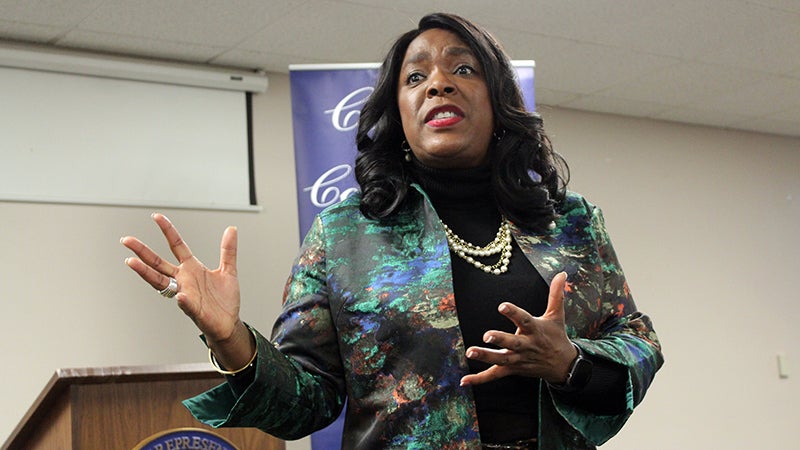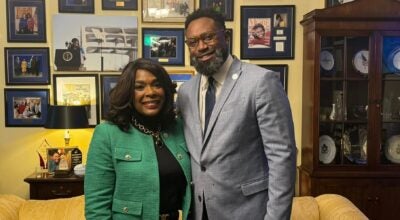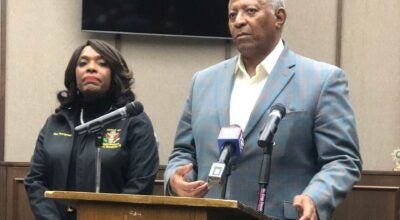Sewell hosts resource fair, town hall at VRMC
Published 3:35 pm Tuesday, February 18, 2020
|
Getting your Trinity Audio player ready...
|
Scores of people packed a conference room at Vaughan Regional Medical Center (VRMC) Tuesday morning to hear from U.S. Rep. Terri Sewell, D-AL, who was hosting a resource fair and town hall event as part of her annual “Congress In Your Community” tour.
The event began with a variety of local healthcare and service providers lining the entry way of VRMC and handing out information packets to those in attendance.
Among the groups represented in the resource fair were the U.S. Department of Agriculture (USDA), the Best Buy Teen Tech Center, Census 2020, Rural Health Medical Program, the Alabama Department of Public Health (ADPH) and more.
“We’re glad to be here to help the community,” said Nancy Lawrence, who was encouraging participation in the upcoming U.S. Census on behalf of the Alabama Department of Economic and Community Affairs (ADECA). “We’re just trying to encourage people to participate in the census.”
ADPH Assistant Administrator Suzanne Terrell stated that she was there to raise awareness about the services available in Dallas County – the department now has a nurse practitioner working in Dallas County five days a week.
Following the resource fair, the crowd filed into the conference room awaiting Sewell’s arrival – Robert Stewart, Black Belt Outreach Coordinator for Sewell’s office, welcomed those in attendance and Dallas County Commissioner Valerie Reubin offered welcoming remarks to Sewell and her staff.
VRMC President and CEO David McCormack introduced Sewell, stating that it would take hours for him to detail all of her accomplishments in Washington and beyond – he noted that she is the first black woman to represent Alabama in Washington and that she is a member of both the House Ways and Means and Intelligence committees.
Sewell covered a lot of ground once she began speaking, discussing healthcare and a range of bills on the table to make it more affordable; talking about the stalemate in Washington that has left 275 bipartisan bills passed by the House languishing in the Senate; intimating the importance of participating in the 2020 Census and more.
Sewell started by discussing the Voting Rights Advancement Act, which cleared the House but is currently awaiting a hearing in the Senate.
“Your vote is your voice,” Sewell said. “That’s how we do representative government in this great country.”
Sewell noted that she is focused on “bread and butter” issues important to voters, but noted that the district must remember its “legacy” as it pertains to voting rights.
Sewell briefly talked about the impeachment trial of U.S. President Donald Trump, which ended with his acquittal in the Senate, stating that there is “no bigger job: for elected representatives than protecting democracy.
“You cannot allow any abuse of power to go unchecked in this democracy,” Sewell said.
On healthcare, Sewell noted that the biggest threat is pricing – to that end, she has co-sponsored a bill that would allow the Centers for Medicare and Medicaid Services (CMS) to negotiate drug prices directly with pharmaceutical companies, just as the Office of Veterans Affairs (VA) currently does.
Sewell also noted that the Affordable Care Act (ACA), which is currently “the law of the land,” needs to be strengthened amid attacks from the Trump administration.
To that end, Sewell and U.S. Sen. Doug Jones, D-AL, have introduced legislation that would allow the states that haven’t expanded Medicaid to do so and receive the same benefits as those that expanded coverage early.
“We have got to get our state representatives, our governor, to expand Medicaid,” Sewell said. “That’s the least we can do.”
Sewell also discussed legislation to increase the number of doctors serving in rural areas.
The congresswoman also discussed the importance of the upcoming census, stating that “every person has a dollar tag stuck to them.”
Alabama collects between $13 billion and $16 billion annually from the federal government – the census determines how and where that money is spent.






